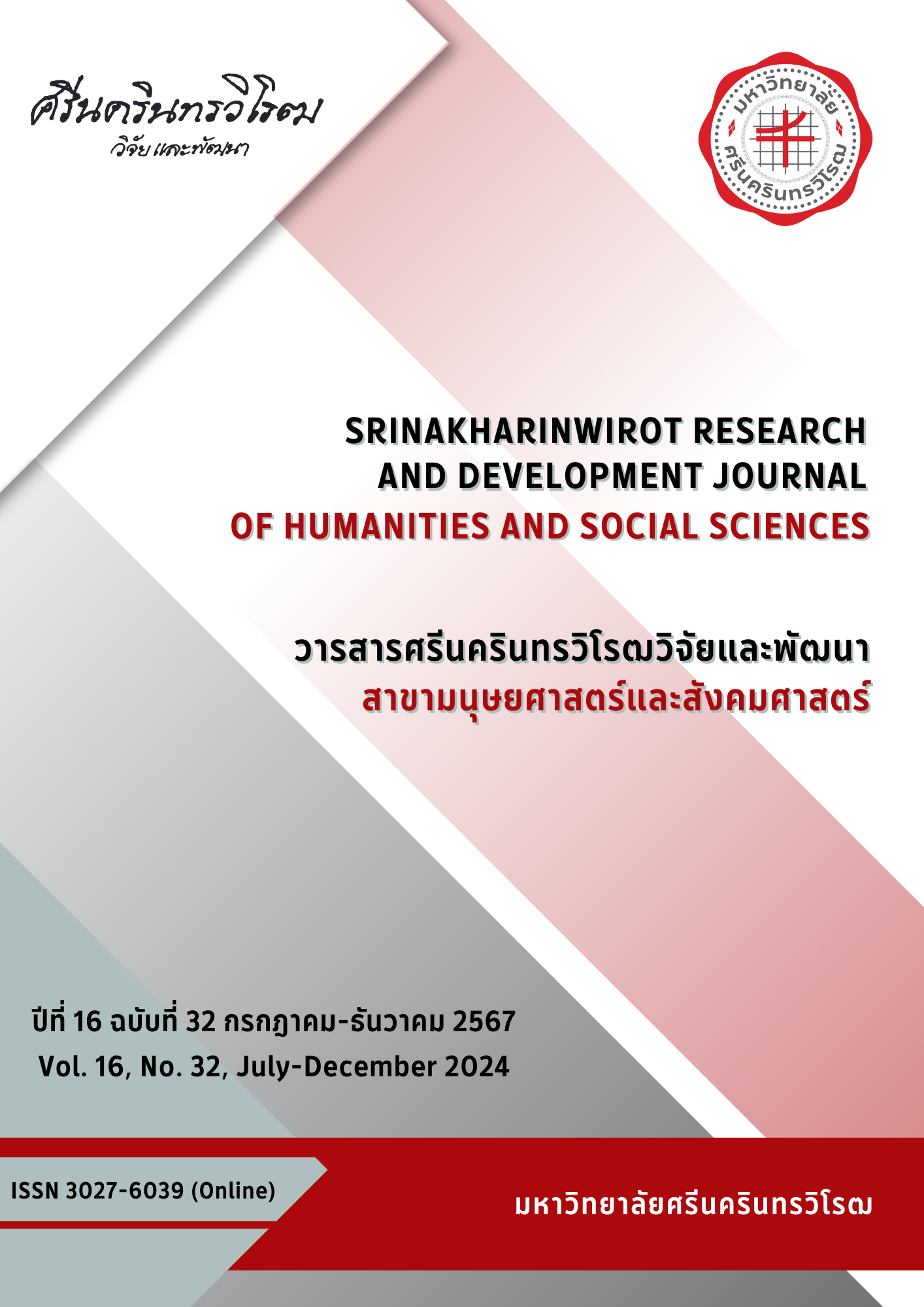THE RELATIONSHIPS BETWEEN SOFT SKILLS AND RISK MANAGEMENT IN GOLDEN JUBILEE MEDICAL CENTER
Keywords:
Soft Skills, Risk Management, Hospital Risk ManagementAbstract
The objectives of this research were 1) to study the Soft Skills level of Golden Jubilee Medical Center of Mahidol University 2) to study the level of risk management of Golden Jubilee Medical Center 3) The relationships between Soft Skills and risk management of Golden Jubilee Medical Center. The sample was 285 personnel working in the Golden Jubilee Medical Center. Faculty of Medicine Siriraj Hospital. Sample were randomly selected by stratified random sampling. The study instrument was questionnaire, divided into 3 parts. 1) Personal characteristics. 2) Personnel Soft Skills level 3) Risk management level of Golden Jubilee Medical Center. Personnel data were collected from May to July 2022 and analyzed by percentage, mean, standard deviation and Spearman’s correlation. The results of the research were as follow: 1) The soft skills level of Golden Jubilee Medical Center personnel overall was high level that ethics skill has the highest level Followed by lifelong learning and ability to adapt respectively. 2) The level of risk management of Golden Jubilee Medical Center was high. In term identification, it was the highest level. Followed by risk management. assess the risk and evaluate the results of risk management respectively. 3) Soft Skills of Golden Jubilee Medical Center personnel was a positive correlation with risk management of the Golden Jubilee Medical Center that statistical significance level of 0.05.
Downloads
References
สุพรรณิการ์ ชนะนิล์, วิภา ชัยสวัสดิ์, พันธ์ทิพา คนฉลาด, และปิยะธิดา ชนะพันธ. (2563). การสำรวจความรู้ความเข้าใจเกี่ยวกับทักษะ Soft Skills ด้านบุคลิกภาพและศิลปะการพูดของนักศึกษาครูในศตวรรษที่ 21. วารสารวิชการ มหาวิทยาลัยราชภัฏบุรีรัมย์, 12(1), 19-36.
มงคล อินตา. (2019). Soft skills: ทักษะที่จำเป็นสู่ความเป็นมืออาชีพของครูยุคใหม่. วารสารวิชาการศึกษาศาสตร์, 20(1), 155-169.
Vasanthakumarai, S. (2019). Soft skills and its application in work place. World Journal of Advanced Research and Reviews, 3(2), 66-72.
Susan, A. D., and Julia, I. E. (2019). Soft Skills Needed for the 21st Century Workforce. International Journal of Applied Management and Technology, 18(1), 17-32.
มงคล กิตติวุฒิไกร, และมนัสดา ชัยสวนียากรณ์. (2558). ผลกระทบของการบริหารความเสี่ยงที่มีต่อความสำเร็จในการทำงานของธุรกิจ SMEs ในจังหวัดมุกดาหาร. วารสารมนุษยศาสตร์และสังคมศาสตร์, 6(1), 105-118.
ตรีรัตน์ พรหมพลุ้ย, วินัย ชุมพล, อนุกูล คำโมนะ, และวริศรา อินทรแสน. (2566). ความสัมพันธ์ระหว่างบรรยากาศองค์กรกับการมีส่วนร่วมในการจัดการความเสี่ยงของบุคลากรศูนย์การแพทย์กาญจนาภิเษก. วารสารศรีนครินทรวิโรฒวิจัยและพัฒนา (สาขามนุษยศาสตร์และสังคมศาสตร์), 15(30), 14-25.
Mousumi, D. P., and Manisha, P. (2018). Soft skills and its application in work place. International Journal of Computational Engineering Research, 8(2), 61-67.
Hill, L. A. (2003), Becoming a manager: How new managers master the challenges of leadership (2nd ed.). Boston: Harvard Business School Press.
รัตนวัชร์ เพ็ญรัตนหิรัญ, และก่องทรัพย์ ทองคำ. (2564). การสำรวจ Soft Skills ที่จำเป็นของสถานประกอบการในศตวรรษที่ 21. วารสารวิจัยรำไพพรรณี, 15(1), 59-69.
ศิริมา พนาภินันท์, และทัศนัย เพ็ญสิทธิ์. (2564). Soft Skills ที่มีความจำเป็นสำหรับนักศึกษาสาขาวิชาดนตรี มหาวิทยาลัยราชภัฏสวนสุนันทา. วารสารศิลป์ปริทัศน์ คณะศิลปกรรมศาสตร์มหาวิทยาลัยราชภัฏสวนสุนันทา, 9(2), 108-112.
Yamane, T. (1976). Statistics: An introductory analysis. 2nd ed. New York: Harper and Row.
ประสพชัย พสุนนท์. (2558). ความเที่ยงตรงของแบบสอบถามสำหรับงานวิจัยทางสังคมศาสตร์. วารสารสังคมศาสตร์ มหาวิทยาลัยศรีนครินทรวิโรฒ, 18(18), 375-395.
อารยา องค์เอี่ยม, และพงศ์ธารา วิจิตเวชไพศาล. (2561). การตรวจสอบคุณภาพเครื่องมือวิจัย. วิสัญญีสาร, 44(1), 36-42.
สมมิตร สิงห์ใจ, นิตยา เพ็ญศิรินภา, และพาณี สีตกะลิน. (2559). ความสัมพันธ์ระหว่างปัจจัยส่วนบุคคล บรรยากาศองค์การ กับการมีส่วนร่วม ในการบริหารความเสี่ยงของบุคลากรในโรงพยาบาลชุมชน จังหวัดเชียงใหม่. วารสารพยาบาลสาร, 43(5), 162-172.
Hauke, J., and Kossowski, T. (2011). Compare of values of pearson’s and Spearman’s correlation coefficient on the same sets of data. Quaestiones Geographicae, 30(2), 87-93.
ชลธิชา โภชนกิจ. (2560). การพัฒนาตัวบ่งชี้สมรรถนะพยาบาลวิชาชีพ โรงพยาบาลสงขลานครินทร์ [วิทยานิพนธ์ปริญญามหาบัณฑิต ไม่ได้ตีพิมพ์]. มหาวิทยาลัยสงขลานครินทร์.
สุมัชฌา ปารัคมาตย์. (2557). การศึกษาวัฒนธรรมองค์กรและองค์กรแห่งการเรียนรู้ส่งผลต่อคุณภาพชีวิตที่ดีของพนักงานในองค์กรกรณีศึกษา ธนาคาร A สำนักงานใหญ่ (บางเขน) [วิทยานิพนธ์ปริญญามหาบัณฑิต ไม่ได้ตีพิมพ์]. มหาวิทยาลัยกรุงเทพ.
ชวาลา ละวาทิน. (2559). การพัฒนาประสิทธิภาพการบริหารความเสี่ยงของสถาบันอุดมศึกษา. วารสารวิจัยและพัฒนา วไลยอลงกรณ์ ในพระบรมราชูปถัมภ์ สาขามนุษยศาสตร์และสังคมศาสตร์, 11(1), 61-69.
เฉลิมชาติ ธีระวิริยะ. (2559). การบริหารความเสี่ยงระดับองค์กรในโรงงานอุตสาหกรรม. วารสารวิชาการมหาวิทยาลัยอีสเทิร์นเอเชีย ฉบับวิทยาศาสตร์และเทคโนโลยี, 10(3), 44-54.
นุชศรินทร์ แพงมา, และพีระพงษ์ บุญสวัสดิ์กุลชัย. (2562). ปัจจัยคัดสรรที่มีอิทธิพลต่อความสำเร็จของการนำนโยบายการบริหารความเสี่ยงในโรงพยาบาลไปสู่การปฏิบัติของผู้บริหารทางการพยาบาลระดับต้น โรงพยาบาลชุมชน เขตสุขภาพที่ 7 กระทรวงสาธารณสุข. วารสารการพยาบาลและการดูแลสุขภาพ, 37(2), 16-24.
ศักรินทร์ ชนประชา. (2562). การศึกษาตลอดชีวิต. วารสาร AsL-NUR บัณฑิต, 14(26), 159-175.
Downloads
Published
How to Cite
Issue
Section
License
Copyright (c) 2024 Srinakharinwirot Research and Development Journal of Humanities and Social Sciences

This work is licensed under a Creative Commons Attribution-NonCommercial-NoDerivatives 4.0 International License.
Srinakharinwirot Research and Development Journal of Humanities and Social Sciences is licensed Under a Creative Commons Attribution-NonCommercial-NoDerivs 4.0 International (CC-BY-NC-ND 4.0) License, Unless Otherwise Stated. Please Read Journal Policies Page for More Information on Open Access, Copyright and Permissions.



